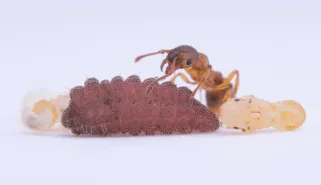Cells, do you need layers of cancer protection but hate juggling multiple proteins? Then an important tumor-suppressor is for you. A new study shows this cancer-controlling protein, p53, does not one, not two, but three different jobs, all in one convenient package.
Previous studies have demonstrated that p53 stops cancer from developing by sensing stress, such as DNA damage, and turning on genes that keep cells from dividing until the damage is repaired. The protein, which is a normal component of cells, also teams up with other molecules to trigger apoptosis, a type of cellular suicide, in over-stressed cells.
And now, researchers from University of Tokyo and their colleagues report in the July 23 Nature that p53 helps slice long pieces of RNA into small regulatory molecules called microRNAs. These microRNAs help control production of proteins, including some involved in cell proliferation, which can lead to cancer if unchecked.
This newly discovered function for p53 is “really surprising,” says Franck Toledo, a geneticist at the Curie Institute’s research center in Paris. Toledo and others have studied p53’s other two roles, but no one previously suspected the protein might also participate in the slicing and dicing of RNAs.
All three of the cancer-related functions require a part of the protein that latches on to specific DNA sequences. Most cancers have some disruption in p53’s action, either a mutation or inactivation of the protein, Toledo says. In many tumors, the mutation lies in the portion of p53 called the DNA-binding domain.
Scientists thought that p53 could direct the production of long RNAs, called primary transcripts, which eventually are broken up into microRNAs. Previous work has shown that the protein turns on production of a long RNA molecule that gets chopped into a microRNA called miR-34.
Mutations in the protein would disrupt production of the primary transcripts, ultimately leading to lower levels of microRNAs. But the Japanese team found that primary transcripts of several microRNAs associated with cancer are made as usual in DNA-damaged cells, indicating that p53 doesn’t play a role in their production. But it was still possible that p53 mutations might disrupt the machinery that chops RNA into microRNA, says Kohei Miyazono, a molecular biologist at the University of Tokyo.
In the new study, Miyazono and colleagues also show that p53’s DNA-binding domain interacts with Drosha and p68, proteins in an assemblage responsible for snipping primary transcripts into hairpin-shaped molecules. Another group of proteins, which includes the protein Dicer, chops the hairpins into the final, mature microRNAs. Levels of both the hairpin-shaped intermediates and mature microRNAs were lower in cells in which p53 was mutated, the team found.
Some of the affected microRNAs that the researchers examined control production of proteins involved in cell proliferation. Having too little of these microRNAs could allow too much of these growth-promoting proteins to be made, leading to uncontrolled growth and cancer.
“What’s really exciting is that they show mutant p53 is actually worse than no p53 at all,” Toledo says.
The normal form of p53 serves as a molecular matchmaker, bringing Drosha and p68 together slightly more efficiently than the two proteins find each other on their own, the researchers showed. But altered forms of p53 spirit away p68, interrupting its interaction with Drosha.
People who have low levels of p53 develop cancer earlier and have poorer prognoses after treatment, Toledo says. It is possible that other variations in the protein may affect the ability to process microRNAs, which could make some people more vulnerable to cancer, he says. The new “findings suggest that, in human cancers, mutations that affect the DNA-binding domain of p53 essentially perform a hat trick by hitting three tumor-suppressive functions at once,” Toledo and colleague Boris Bardot, also at the Curie Institute, write in a commentary published in the same issue of Nature.
Miyazono says p53 is clearly important in cancer cells, but might not be as crucial for microRNA processing in normal cells. The protein’s function might be performed by other proteins in normal cells, he suggests. His group is working on different components of the microRNA-processing machinery, so other researchers will have to figure out p53’s normal role in making microRNAs.
Still, he thinks the findings could have clinical applications if researchers can find ways to restore mutated or inactivated p53 to normal function. “It’s probably a naive idea, but we think it could be an important target for treating cancer,” he says.





